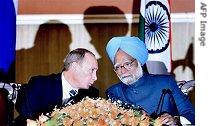-
(单词翻译:双击或拖选)
New Delhi
25 January 2007
Russian President Vladimir Putin and Indian Prime Minister Manmohan Singh have signed a deal for Russia to help India build nuclear power plants. VOA's Suzanne Presto in New Delhi reports that Mr. Putin is focusing on energy and trade on his visit to India.

Russian President Vladimir Putin (L) and Indian Prime Minister Manmohan Singh talk to each other during their press conference in New Delhi, 25 January 2007
Under the agreement signed Thursday, Russia will help India construct four new nuclear reactors2 for peaceful purposes.
The reactors are to be built at the Kudankulan nuclear power plant in southern India's Tamil Nadu state and elsewhere.
Speaking at a news conference after a signing ceremony in New Delhi, Indian Prime Minster Manmohan Singh said energy issues are central to India's long-term partnership3 with Russia.
"Energy security is the most important of the emerging dimensions of our strategic partnership," Singh said. "Russia's position as a global leader on energy issues is widely recognized. We look forward to a long-term partnership with Russia in this vital field."
President Vladimir Putin stressed that the countries intend to cooperate in the peaceful uses of the atom.
Russia and the United States are competing for stakes in India's nuclear market, as India seeks additional sources of power to support its rapidly growing economy.
Mr. Singh thanked Russia for its help in the field of nuclear development.
"We appreciate Russia's support in lifting international restrictions4 on nuclear cooperation within India and assisting us in the expansion of our nuclear energy sector5," he said.
Mr. Putin also spoke6 of intensified7 cooperation in the fuel sector.
He applauded the joint8 construction of infrastructure9 in India and the region for the production and transportation of oil and natural gas.
In addition, the nations agreed to boost cooperation in space and technology. Russia will allow India to use its global navigation satellite system, GLONASS. The two governments also agreed to cooperate in aviation, and India expressed specific interest in the development of a transport plane and a new fighter jet.
On the economic front, Mr. Putin stressed that increasing trade and business contacts between the nations is of prime importance.
He says the shared goal is to broaden the field of business cooperation by seeking out new models of interaction.
India and Russia have long cooperated in defense10 issues and trade, a relationship that dates back to the days of the former Soviet11 Union.
The relationship, however, has weakened in the past 16 years, after the Soviet Union broke apart and India began to look toward the United States and Europe for trade and technology. Mr. Putin's visit is in part designed to revive ties.
Mr. Putin will conclude his two-day visit to India on Friday. He is to be a guest of honor Friday at India's Republic Day ceremonies.
 收听单词发音
收听单词发音
1
presto

|
|
| adv.急速地;n.急板乐段;adj.急板的 | |
参考例句: |
|
|
|
2
reactors

|
|
| 起反应的人( reactor的名词复数 ); 反应装置; 原子炉; 核反应堆 | |
参考例句: |
|
|
|
3
partnership

|
|
| n.合作关系,伙伴关系 | |
参考例句: |
|
|
|
4
restrictions

|
|
| 约束( restriction的名词复数 ); 管制; 制约因素; 带限制性的条件(或规则) | |
参考例句: |
|
|
|
5
sector

|
|
| n.部门,部分;防御地段,防区;扇形 | |
参考例句: |
|
|
|
6
spoke

|
|
| n.(车轮的)辐条;轮辐;破坏某人的计划;阻挠某人的行动 v.讲,谈(speak的过去式);说;演说;从某种观点来说 | |
参考例句: |
|
|
|
7
intensified

|
|
| v.(使)增强, (使)加剧( intensify的过去式和过去分词 ) | |
参考例句: |
|
|
|
8
joint

|
|
| adj.联合的,共同的;n.关节,接合处;v.连接,贴合 | |
参考例句: |
|
|
|
9
infrastructure

|
|
| n.下部构造,下部组织,基础结构,基础设施 | |
参考例句: |
|
|
|
10
defense

|
|
| n.防御,保卫;[pl.]防务工事;辩护,答辩 | |
参考例句: |
|
|
|
11
Soviet

|
|
| adj.苏联的,苏维埃的;n.苏维埃 | |
参考例句: |
|
|
|















